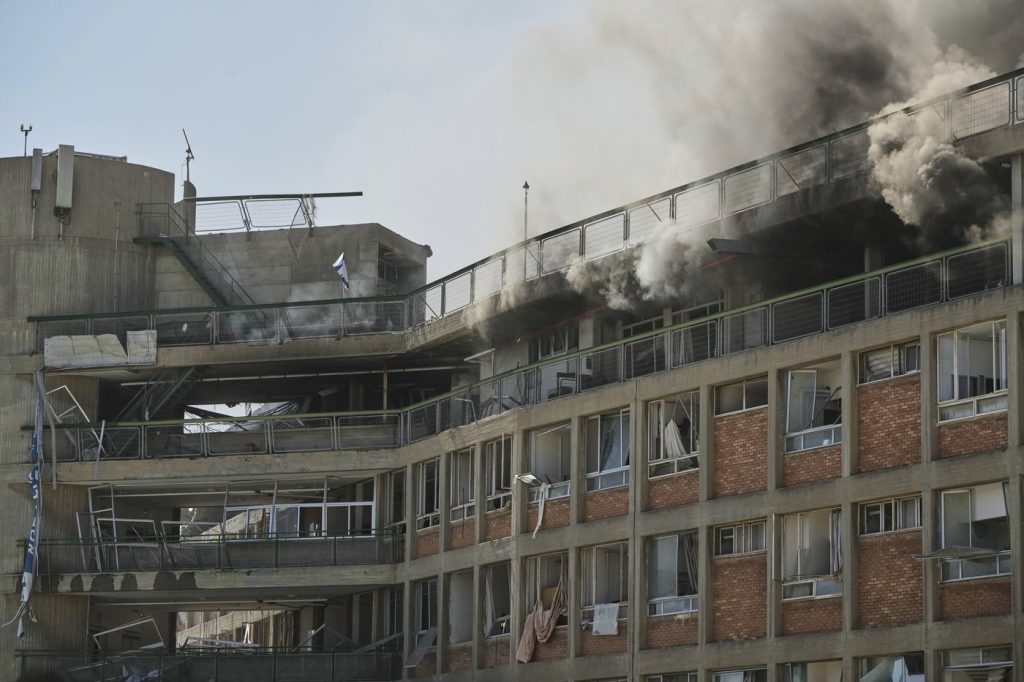BEERSHEBA, Israel (AP) — An Iranian missile struck the Soroka Medical Center in southern Israel early Thursday, causing significant damage but, fortunately, no serious injuries reported. Multiple other missiles targeted a high-rise building and several residential structures near Tel Aviv, resulting in at least 40 injuries according to Israel's Magen David Adom rescue service. Black smoke billowed from the hospital in Beersheba as emergency teams swiftly evacuated patients from the affected areas.
Following the missile strikes, Israel launched retaliatory airstrikes on Iran's Arak heavy water reactor, marking an escalation in a conflict that ignited days earlier. This new wave of attacks initiated with an Israeli airstrike campaign targeting military sites and nuclear personnel in Iran. Reports suggest that at least 639 people have been killed in Iran, including 263 civilians, with Iran retaliating by firing approximately 400 missiles and drones into Israel, resulting in 24 fatalities and hundreds injured.
Iran's Foreign Minister Abbas Araghchi announced plans to travel to Geneva for discussions with European officials, indicating potential diplomatic efforts to de-escalate tensions. The talks are set to include foreign ministers from the UK, France, Germany, and the EU's high representative. U.S. President Donald Trump has expressed a desire for a more significant response than a ceasefire and hasn't excluded American involvement alongside Israeli operations, which Iran warned would carry severe repercussions.
Witness accounts indicate that the missile struck Soroka Medical Center shortly after air raid sirens activated, producing a loud explosion that resonated beyond the immediate danger zone. The facility, which has over 1,000 beds and caters to roughly 1 million residents, temporarily halted patient admissions except for critical cases after the incident. Israeli Prime Minister Benjamin Netanyahu condemned the strike, vowing to hold the Iranian regime accountable for its actions.
While Iran has discharged numerous missiles and drones, the majority have been intercepted by Israel’s multi-tiered air defense system. Despite these defensive measures, Israeli officials acknowledge that countermeasures are not foolproof. Local police reported minimal injuries resulting from the missile strike at the hospital, where many medical facilities have implemented emergency protocols, relocating patients and converting underground parking areas into treatment spaces.
In parallel, Israel confirmed its military’s assault on the Arak facility, targeting parts involved in plutonium production. Officials emphasized that the strike aimed to preemptively prevent the reactor from being restored for use in developing nuclear weapons. Iran's state television later assured that there was no radiation threat following the attack, asserting that the facility had cleared vulnerable personnel and suffered no impact on surrounding civilian areas.
The Arak heavy water reactor, located 250 kilometers southwest of Tehran, has been a focal point of international concern surrounding Iran's nuclear ambitions. The facility was initially redesigned as part of the 2015 nuclear agreement to mitigate proliferation risks but remains a potential avenue for nuclear weapon development through plutonium production. Following the U.S. withdrawal from the nuclear deal in 2018, Iran’s nuclear activities have intensified, further raising international alarm.
In conclusion, the ongoing conflict illustrates escalating tensions between Israel and Iran, with military strikes and the threat of broader conflict looming large over the Middle East. As both sides continue to exchange attacks, the global community watches closely, hoping for diplomatic resolutions amidst a backdrop of violence and casualties.











